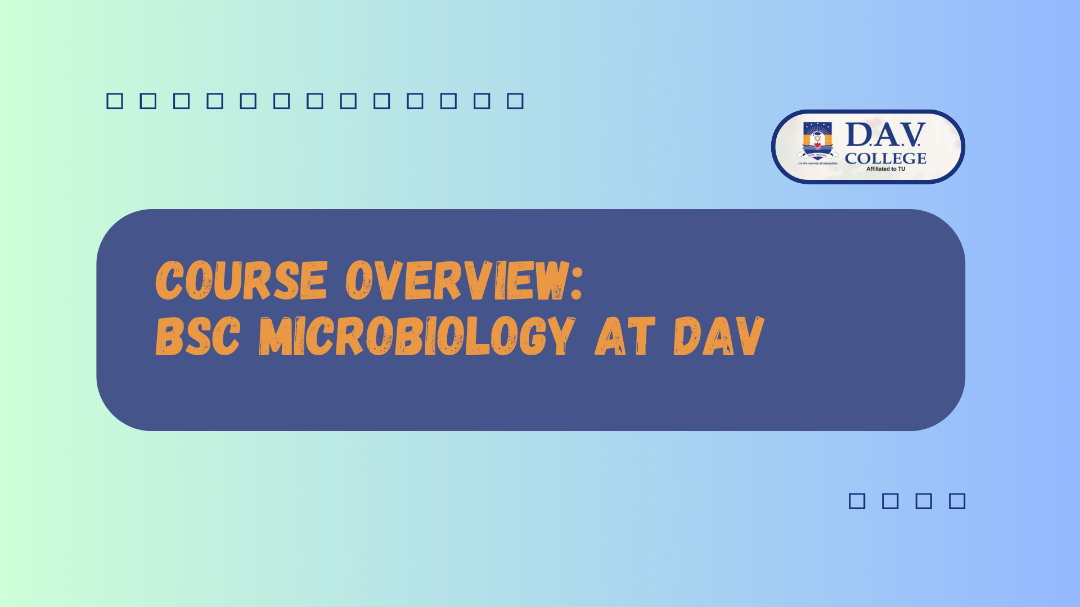What You’ll Study in the BSc Microbiology Program at DAV College
Published on 2025-07-24

Choosing the right program starts with knowing exactly what you’re signing up for. If you're considering the BSc Microbiology program at DAV College, understanding the course structure will help you align your academic goals with what the curriculum offers.
Let’s break down the complete syllabus at DAV College—year by year—so you know what subjects you’ll tackle, what skills you'll build, and how this program prepares you for the world of research, diagnostics, and industrial microbiology.
Overview: BSc Microbiology at DAV College
The BSc Microbiology program is a 4-year undergraduate degree offered under the Faculty of Science at Tribhuvan University (TU). DAV College, as a TU-affiliated institution, follows the standardized syllabus approved by the university while adding its edge through high-end labs, experienced faculty, and regular research exposure.
The curriculum is designed to develop strong theoretical knowledge and practical expertise in microbial biology, molecular techniques, immunology, environmental microbiology, and biotechnology.
Year-wise Curriculum Breakdown
1st Year: Laying the Foundation
This year builds your basic science knowledge with an emphasis on general microbiology and supporting disciplines.
Subjects:
- Microbiology I (General Microbiology): Topics include microbial diversity, classification, cell structure, growth, and control of microorganisms.
- Chemistry I (General & Organic Chemistry): Introduces the chemical principles essential for understanding biochemical processes.
- Mathematics / Physics: Depending on your selection, you'll learn either calculus and biostatistics or basic physics principles.
- English: Focus on scientific writing and comprehension.
By the end of Year 1, you’ll understand the diversity of microbial life and how foundational sciences support microbiological processes.
2nd Year: Diving into the Microbial World
This year explores more detailed microbial physiology and genetics.
Subjects:
- Microbiology II (Microbial Physiology and Biochemistry): Covers metabolic pathways, enzyme action, respiration, fermentation, and biosynthesis.
- Chemistry II (Biochemistry & Physical Chemistry): Prepares you for lab-based microbial biochemical analysis.
- Biostatistics and Computer Applications: Learn statistical tools used in experimental biology and basic data handling using software.
You’ll begin applying theory in the lab—culturing bacteria, measuring enzyme activity, and working with microbial DNA.
3rd Year: The Complexity Deepens
This is when things get more technical, covering applied microbiology, molecular biology, and environmental sciences.
Subjects:
- Microbiology III (Molecular Biology and Genetics): Deep dive into DNA replication, gene expression, mutation, plasmids, and horizontal gene transfer.
- Microbiology IV (Environmental and Agricultural Microbiology): Understand microbial roles in soil fertility, biogeochemical cycles, water treatment, and biofertilizers.
- Medical Microbiology: Basic human pathogens, infection types, and laboratory diagnosis.
By this stage, you’re trained to analyze bacterial genomes, assess environmental samples, and understand how microbes affect human and ecosystem health.
4th Year: Specialization and Application
In the final year, you specialize in core areas and complete a research project—often your first mini-thesis.
Subjects:
- Medical Microbiology II: In-depth study of bacterial, viral, fungal, and parasitic infections, antimicrobial resistance, and vaccines.
- Food and Industrial Microbiology: Fermentation processes, food safety, quality control, and production of enzymes and antibiotics.
- Immunology and Immunotechnology: Learn how the immune system functions and how modern diagnostics (ELISA, RIA, etc.) are developed.
- Research Project / Internship: Work in a lab or field setting to complete original research under faculty guidance.
This year integrates your knowledge with real-world applications—whether in disease diagnostics, biotech labs, or industrial production.
Lab Work & Practical Training
DAV College places strong emphasis on practicals throughout the program:
- Microbial culture and isolation techniques
- Biochemical tests and staining
- Antibiotic sensitivity testing
- Molecular techniques: PCR, electrophoresis
- Water quality analysis
- Fermentation process setup
- Industrial visits and seminars
Labs are well-equipped and often include external training sessions with hospitals, biotech companies, and research institutes.
What Skills Will You Gain?
- Scientific reasoning and data interpretation
- Hands-on microbiological techniques
- Research and reporting skills
- Teamwork in lab environments
- Application of microbiology in health, food, agriculture, and industry
After Graduation: Where Does This Take You?
This syllabus doesn’t just prepare you for exams—it’s a launchpad for:
- Master’s programs in Microbiology, Biotechnology, or Public Health
- Lab-based roles in hospitals, research centers, or diagnostic labs
- Entry-level jobs in the pharmaceutical or food industries
- NGO and environmental monitoring roles
Final Thoughts
The BSc Microbiology program at DAV is more than a collection of subjects—it's a skill-building journey. With strong fundamentals, modern lab exposure, and a deep dive into medical and industrial microbiology, this curriculum prepares students to become tomorrow’s scientists, lab technologists, or innovators in biotech.
Suppose you're passionate about understanding life at the microscopic level and want a degree that combines theory with practical application. In that case, DAV College offers one of the most comprehensive microbiology programs in Nepal.
Frequently Asked Questions
Is the BSc Microbiology syllabus at DAV College different from that of other TU colleges?
DAV College follows TU’s official syllabus, but it enhances it with updated practicals, more lab time, industry linkages, and focused mentorship.
Do students get to do a research project in the BSc Microbiology program?
Yes. In the 4th year, students complete an individual research project or internship—an essential part of the final evaluation.
How practical is the BSc Microbiology course at DAV?
Very. Each theoretical subject is paired with lab sessions, allowing students to gain early exposure to diagnostic and industrial tools, making them job-ready or research-capable upon graduation.